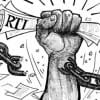A case for making jobseekers’ info open data

When I informed my PhD supervisor that I wanted to work on a topic related to Bangladesh, he asked me a small but very important question: "Do you have data?" I believe Bangladeshi academicians, researchers, and public policymakers always come across this question.
There is a huge need for data in every aspect of human life today – from personal life to business, social, scientific, economic, and public policy and decision-making processes. Statistical organisations in different countries, especially the developed ones, collect data for the economy, health, education, labour force, and other social indicators by using different survey methods. This data helps formulate, evaluate, review, and research various public policies. One of the most innovative inventions in the 21st century is artificial intelligence, and data is one of the foundations of this ingenious invention.
Not only Bangladesh, but many developing countries have insufficient data availability because of the lack of infrastructure, investment, and human resources in this area. However, in today's age of digitalisation, data collection, storage, and use have become much easier.
In Bangladesh, jobseekers now apply for employment mostly online. This process has made the previous manual information management easier for the recruiting agencies and has helped a lot in speeding up the process for those organisations. However, so far, this data is only used for the needs of the respective organisations. At most, these organisations disclose such information as per the requirement of the higher authorities of the government. In some cases, the authority concerned provides information to an individual under the purview of the Right to Information (RTI) Act.
But there are scopes for using this data more widely for the country's needs.
It may be noted here that the Bangladesh government adopted the Open Government Data Strategy in 2016 in its efforts to promote open data. It aims to make public service available efficiently and transparently, promote innovation and research, and improve Bangladesh's national economy. With a view of "Data for All," the government portal was launched in 2016 to provide a common platform for publicly available datasets. Still, it requires all-out support from the public sector organisations.
In the present context of Bangladesh, a few public-sector recruiting agencies can promote the government's open data agenda. In particular, the Bangladesh Public Service Commission, the Bankers' Selection Committee of Bangladesh Bank, and the Directorate of Primary Education can perform this task very well as these organisations collect and preserve massive amounts of information about jobseekers.

Every year, millions of jobseekers apply to these government institutions. For example, more than 350,000 people applied for the 44th BCS examination, and more than 1.3 million candidates submitted online applications in the last circular for the post of assistant teacher of government primary schools. Job applications are usually accompanied by personal, educational, family, and other relevant information. This information can create datasets that can be used in many social and economic analyses and research, including education, unemployment, poverty, and inequality, and help policymakers formulate better policies that are more realistic and people-friendly.
However, there are plausible concerns about open data. The risk of the violation of privacy and potential misinterpretation of data due to poor documentation are among the top concerns. In that case, appropriate legal measures and sound technical support can make the data anonymous and ensure meticulous, accurate documentation.
It is worth mentioning a recent bold step taken by the Public Service Commission of Tamil Nadu in India. The commission has adopted an open data and proactive disclosable information policy, designing it in such a manner that does not allow a data user to identify any job applicant. The data release only includes the details of everyone who applied, their test scores, and the selection outcomes.
Public sector recruiting agencies' willingness and efforts to publish jobseekers' anonymous data can create huge datasets, which can be used for analysis and research, and effectively determine the cause of the nation's many socioeconomic issues – and help find ways to solve them.
Md Rashedur Rahman Sardar is a member of Bangladesh Civil Service, currently pursuing a PhD in economics at the University of North Carolina at Greensboro in the US.

 For all latest news, follow The Daily Star's Google News channel.
For all latest news, follow The Daily Star's Google News channel. 









Comments